New EcoLeague Jobs Board

The EcoLeague is proud to announce our new Jobs Board. This is a joint project between our six consortium colleges, with all of the Internship and Job Coordinators working together and contributing postings from each institution’s many opportunities. The EcoLeague Jobs Board is unique in that all the postings relate to the environment or sustainability in some way. Through this collaboration we are able to provide our students greater access to internships and jobs across the USA. We hope that you will take the time to look at this jobs board, which you can find in the menu on our website.
EcoLeague Faculty Scholar Davis Taylor to Speak At Northland College
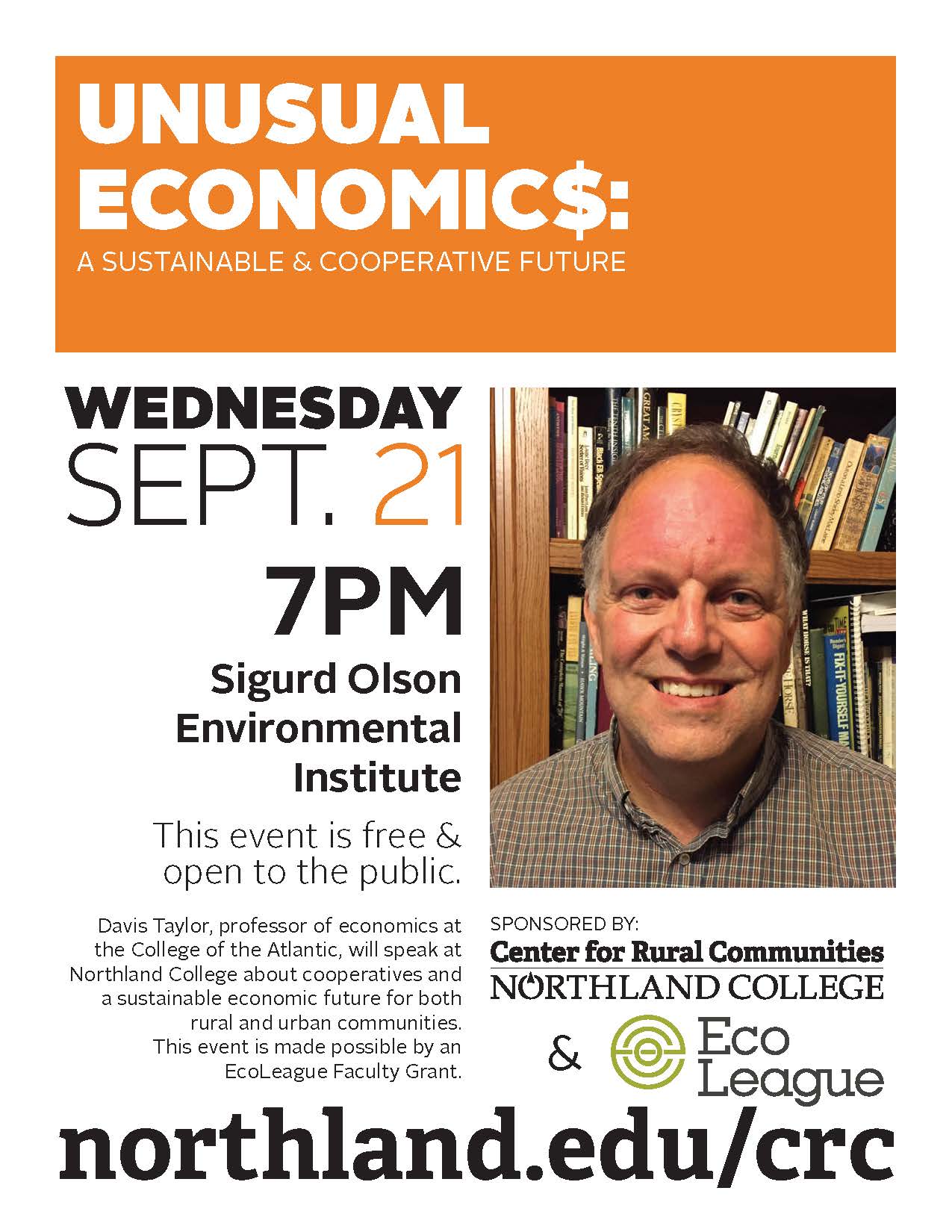
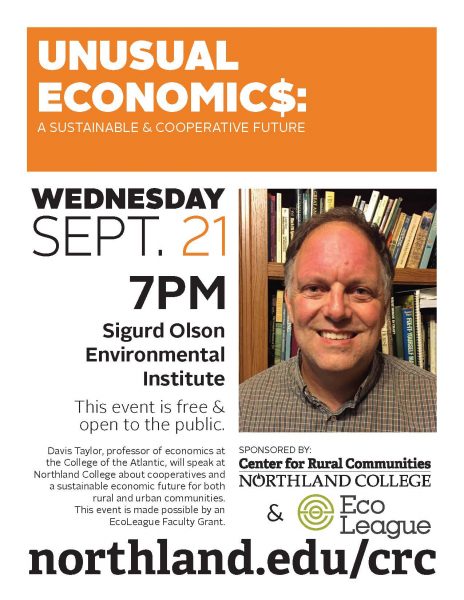 Unusual Economics: A Sustainable and Cooperative Future
Unusual Economics: A Sustainable and Cooperative Future
Davis Taylor, professor of economics at the College of the Atlantic, will speak at Northland College about cooperatives and a sustainable economic future for both rural and urban communities Wednesday, September 21 at 7 p.m. at the Sigurd Olson Environmental Institute.
This event is sponsored by the Northland College Center for Rural Communities and the EcoLeague, a consortium of six colleges and universities that share missions based on environmental responsibility and social change, including College of the Atlantic and Northland College. Davis’ visit is made possible by an EcoLeague Faculty Scholar Grant, which encourages faculty at member schools to collaborate with each other in areas of teaching and research across institutions.
Taylor pursues research in various forms of economics as well as sustainable community development. He has presented papers that expand upon the concepts of community and model the human ecology of forests. His current research efforts include the economics of food systems, the role of institutions in shaping economic development, and the ecological economics of resource collapse.
This event is free and open to the public.
Dog Mushing, Desert Canyons, and Singing Out: EcoLeague Students on the Move!
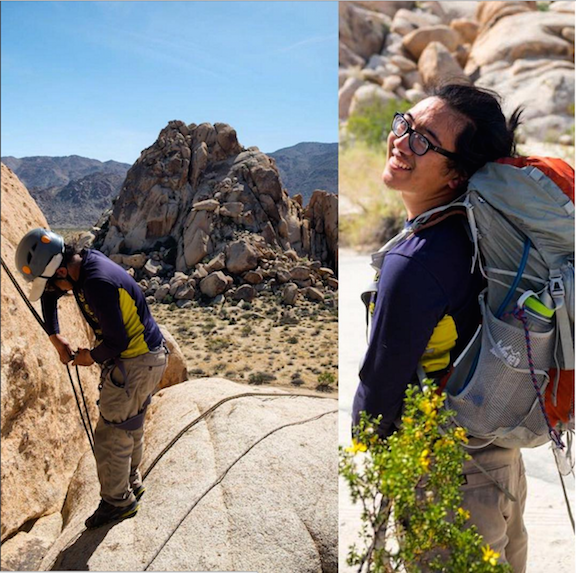
by Jasmyn DiMeglio, EcoLeague Writing Intern
“We  experienced a waking jolt from an earthquake with a 7.1 magnitude, saw a moose and her calf, attempted to ski down a forty-degree angled hill with heavy sleds tied to our packs, and had the pleasure of setting up a tent in forty mph winds,” says sophomore Audrey Roberts, about her tour in the Alaskan mountains near Hatcher Pass. “Our ten-day trip was quite eventful.”
experienced a waking jolt from an earthquake with a 7.1 magnitude, saw a moose and her calf, attempted to ski down a forty-degree angled hill with heavy sleds tied to our packs, and had the pleasure of setting up a tent in forty mph winds,” says sophomore Audrey Roberts, about her tour in the Alaskan mountains near Hatcher Pass. “Our ten-day trip was quite eventful.”
Whether packing for a dog sledding trip in blustery winds, preparing to rock climb in a desert, or registering a new Choir course, EcoLeague exchange students are also preparing for exciting surprises and diverse learning opportunities. Audrey, Andrew, and Melody are three of nine students participating in EcoLeague’s exchange program this Winter-Spring semester. Through this unique academic opportunity, students enrolled at any of the six EcoLeague member colleges have the option to move their studies to another campus for a semester or two during their undergraduate career. Located in disparate bioregions, such as the North woods of Wisconsin, the shores of the Atlantic in Maine, or the desert canyons of Arizona, each college offers a unique academic atmosphere in breathtakingly diverse landscapes. Despite the geographical differences, the small liberal arts colleges of the EcoLeague consortium are also very similar in their shared values of environmental thoughtfulness, sustainability, and social change.

Andrew limbing a 5.10a face climb on Short Wall, Joshua Tree National Park
“One similarity that I’ve found is that both schools attract a certain kind of student, individuals who are incredibly passionate about what they do,” says Andrew Nguyen, a student from College of the Atlantic (COA) in Bar Harbor, ME, who is currently on exchange at Prescott College in Prescott, AZ. “They are the kind of people who go above and beyond to follow their dreams, and are driven by their own self-direction,” he says. A sophomore majoring in Human Ecology with concentrations in Sustainable Business and Outdoor Ed., Andrew also appreciates the common emphasis on “hands-on” learning at both schools, which he says aligns well with his personal learning style. Though Andrew describes both Prescott and COA to be incredibly similar, he has also noticed slight differences between the two rigorous academic programs.
“Prescott College is different from COA in the sense that it has different academic strengths. Whereas COA has an amazing Environmental Science program, Prescott has an incredible Adventure Education program,” he says. Like many EcoLeague students, Andrew appreciates this difference as it provides for a rich and “well-rounded” educational experience. Andrew is excited by the opportunity to focus on improving his Outdoor Education (OED) skills at Prescott. Currently, he is enrolled in OED courses such as “Outdoor Program Administration” and “Fear & Risk Through Rock Climbing,” both of which he enjoys.
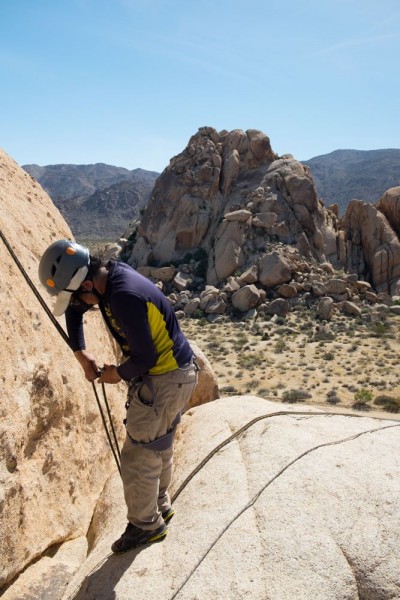
Rigging a double-strand rappel on top of Pixie Rock in Joshua Tree National Park.
“My time at Prescott College has been an excellent opportunity to become a better educator, to understand more thoroughly the administrative and operational processes of outdoor programs, and to become more adept at risk-management and decision-making,” says Nguyen. After college, Andrew hopes to combine his sustainable business skills, which he’s cultivated at COA, with his Adventure Education training and eventually manage an “Outdoor School.” Enthusiastic about his Adventure Ed. courses as well as the supportive Prescott College community, Andrew believes his EcoLeague exchange will enrich his academic development and will be useful in accomplishing his future goals.
Meanwhile, roughly 3,588 miles away, Audrey Roberts also is impressed and excited by the rigorous OED program at Alaska Pacific University (APU) in Anchorage, Alaska. “One of APU’s programs I have found to be pretty amazing is the Outdoor Studies program,” says Audrey. Intending to major in Natural Resources with an emphasis in Fisheries & Wildlife, Roberts has also recently considered incorporating Outdoor Education into her degree after spending a few months at APU. “I took a ‘Winter Wilderness’ course that included camping and touring in the mountains for ten days—learning about camping in the winter and navigating the avalanche terrain. It was quite the experience,” she says.
Another notable aspect of Audrey’s exchange has been the classroom environment at APU, which is very similar to that at her home school, Northland College in Ashland, WI. “Classes are small and interactive. Teachers and students have a close relationship and help is never far behind,” she says. Audrey also appreciates how easy it is to become involved in extra curricular activities. “Like Northland, you can always find something to join; alpine club, climbing group, photography, or even a paranormal club,” says Roberts. Overall, the tight-knit community at APU has been a highlight of Audrey’s EcoLeague experience. “Everyone knows everyone. You can always find a friend to go for a climb or a hike on the trails around Anchorage!” In addition to the familiar values of community-building, Audrey also enjoys the enriching academic opportunities available at APU.
“The classes I’m taking here are definitely helping me think about and explore my choices in studying Fisheries,” she says. “My ‘Applied Research’ course meets once a week to discuss current issues in Fisheries and climate change. We also get to talk with APU’s graduate students about their senior research project findings,” says Roberts. Aside from her Fisheries studies, Audrey has also enjoyed exploring new subjects, such as her “Dog Mushing” course. “Every Saturday we meet and assist in handling the dogs in the races. What I’m most excited for is getting to help handle the dogs for the Iditarod race.”
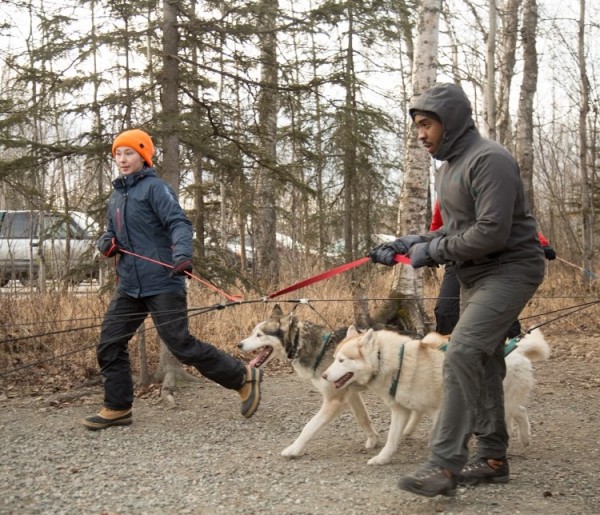
Audrey learning dog mushing skills at APU
Despite the discipline, Audrey believes her EcoLeague exchange courses have ultimately enhanced her academic growth. “I full-heartedly believe that EcoLeague is helping me take giant steps in my academic career. Not only do I get to study in a different and absolutely beautiful place, I get to experience the same thing I would back home, except with different eyes,” she says. “You can only learn so much in one place. Since being up here I’ve learned about so many different kinds of fish and birds—it’s seriously amazing seeing and getting to learn all of it in the flesh instead of in a book.”
Like Audrey, Melody Sarian also appreciates the freshness of a new environment during her EcoLeague exchange at Green Mountain College (GMC) in Poultney, VT. “I am so grateful to have had the opportunity to EcoLeague and to have learned so much about the ways in which I can bring ideas back to my home school,” says Sarian. “Seeing different schools which I have ties to provides me the insight needed to instill change and fresh ideas between them.” A junior majoring in Liberal Arts Studies with a concentration in Creative Writing, Melody values the creative atmosphere at GMC, which is “eco savvy,” with plenty of nice people who are always willing to lend a hand, much like at her home school, APU. A returning EcoLeague student, Melody also believes the program has helped enrich her academic development on the path to her degree. “I have gained so much knowledge here that I’m almost certain I couldn’t get anywhere else,” she says.
Melody is particularly enthused by the REED program offered through GMC’s academics. “REED is an amazing Ecological Architecture program which I have really taken a liking to!” A unique major and academic department at GMC that combines both Architecture and Sustainability Studies, REED stands for “Renewable Energy & Ecological Design,” offering courses such as “The Ecological Design Studio”, “Revolutionary Europe”, and “Seminar to Interdisciplinary Approaches to Literature,” all of which Melody has really enjoyed.
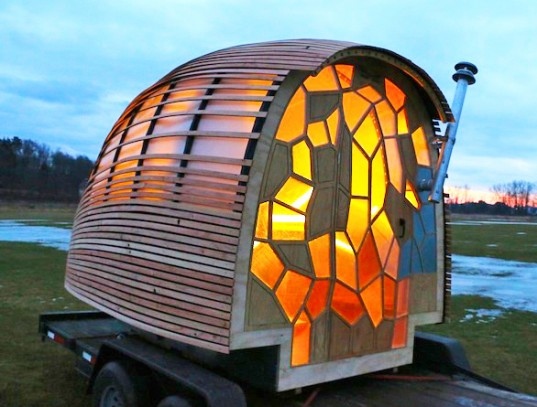
REED Program Tiny House Design
“I especially love the Arts and History classes I have taken here. The Arts program is so diverse and expansive towards individualistic, hands-on learning and I love it,” she says. Another course offered at GMC that Melody appreciates is Choir. “Choir has been one of the best things I’ve been a part of on the GMC campus because I love singing!” With a wide array of creative and intellectually stimulating course offerings, Melody’s EcoLeague exchange at GMC has been beneficial in regards to her future plans. “I’ve learned so much and want to apply this to any careers and artistic endeavors I will peruse in the future.”
Despite differences in geographic location and academic emphases, each EcoLeague school offers a unique and rigorous learning environment that values environmental awareness, creativity, community-building, and hands-on learning experiences. Regardless of the major, the exchange program serves to aid academic and personal growth in preparation for fruitful future and professional experiences. Whether trekking through Alaskan mountains, climbing rocky terrains, or studying art in the Vermont countryside, the EcoLeague exchange program provides students with expansive and exciting opportunities.
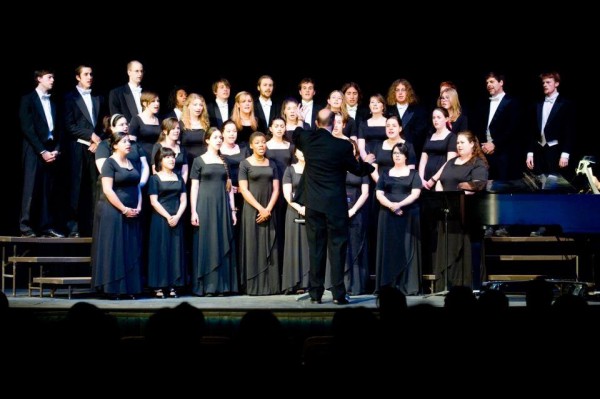
GMC Choir’s “Jazz Ensemble” Performance
River Canyons and Open Waters: Outdoor Education with EcoLeague
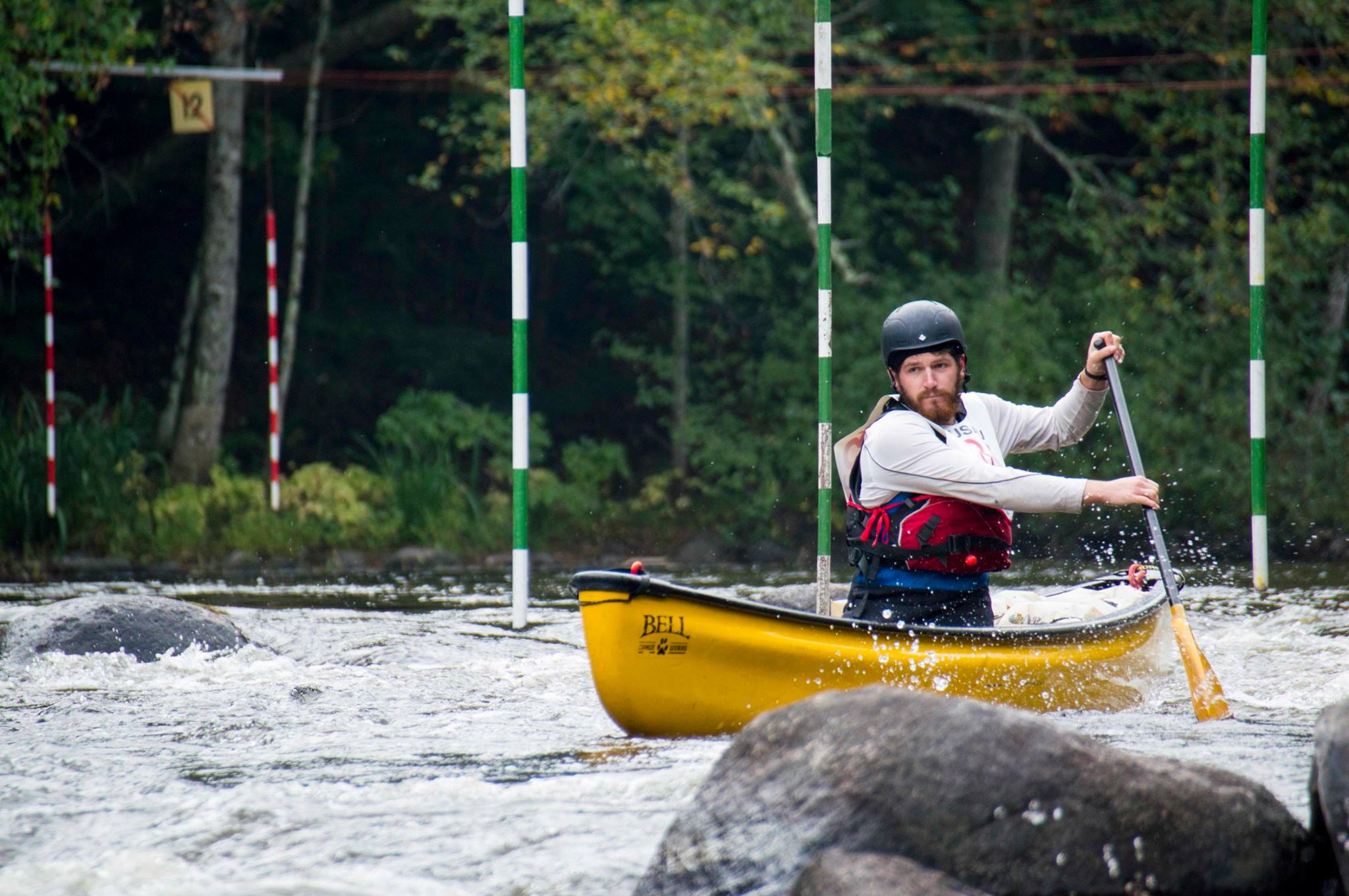
by Jasmyn DiMeglio, EcoLeague Writing Intern
Why pursue a degree in Outdoor Education? Perhaps you have a hearty appetite for travel, perhaps you’re eager to pair wilderness skills with values of equality and justice, or maybe you’re simply interested in fostering personal growth through adventure experiences with at-risk youth. For Dashiell Potter, a junior and EcoLeague exchange student, motivation stems from all of the above.
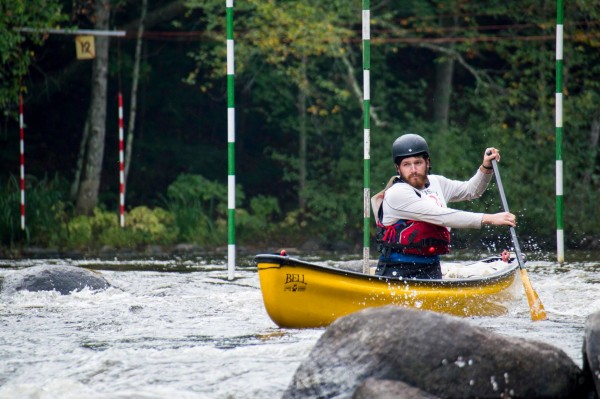
Dashiell Potter competing in a slalom race on the Wolf River as part of the Professional Development Semester.
Exercising experiential education practices, the field of Outdoor Ed. (OED) promotes both interpersonal and intrapersonal growth and aims to connect participants to the natural world. Although based in immensely different nature environments, both Northland and Prescott Colleges’ OED programs share similar core values, philosophies, and theories, which are deeply embedded in their curriculums. Located in the North woods of Ashland, WI, Northland College’s program is shaped by the breathtaking presence of Great Lake Superior as well as by the natural history and community of the region. On the other hand, nearly 1,900 miles away in Prescott, AZ, Prescott College’s program prioritizes field opportunities within the elevated desert landscape.
“Both places give a lot of opportunity for exploration”, says Dashiell Potter. Each offering a unique and wholesome approach to Outdoor Education, both EcoLeague schools serve as great foundations for students hoping to pursue their careers in the outdoors, much like Dashiell, a Northland student who participated in the EcoLeague exchange program and spent an exciting semester at Prescott.
Potter’s interest in wilderness exploration and outdoor travel started at the young age of twelve. Growing up, Dash enjoyed attending a wilderness adventure camp in Northern Minnesota but it wasn’t until after a spending a “gap” year in Patagonia through the National Outdoor Leadership School (NOLS) program, when his passion really “clicked” and he knew he wanted to pursue a degree and eventually a career in the field of Outdoor Education.
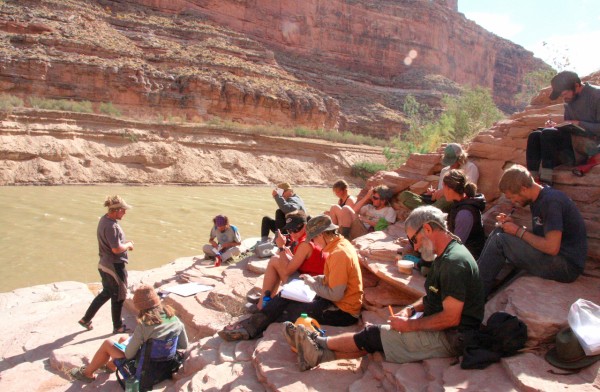
Prescott College’s field-based Wilderness Exploration Landscape course
“Outdoor Ed. is important because it gives people the opportunity to learn and grow in a different environment, other than a classroom,” says Potter. “It’s also based in experiential education, which is hands on learning– you’re learning by doing.” Learning about the importance of experiential education in the two very different regions of WI and AZ was extremely beneficial for Potter’s academic development on the path to his degree. “They both have great place-based learning aspects to their curriculum. It was great to experience a different place and program because I was able to take what I learned in the desert back home to the North woods with me,” he says.
OED also provides students with the opportunity for extensive travel. One of Dashiell’s favorite courses at Northland was “Wilderness Instructor Training”. Designed as a month long intensive field course in Arkansas, Dash learned about technical skills of whitewater paddling while simultaneously refining teaching and wilderness leadership skills. Although he took this course during his freshman year, it is still one of the most memorable for him. “This was an incredible trip where I learned about being a leader, living in the wilderness and working efficiently as a group.
Like Northland, Prescott also offers highly integrated courses which was a highlight for Dash. “These courses blend outdoor education with other disciplines, between content and experience or the tactile and the cognitive,” says David Lovejoy, an Adventure Education professor at Prescott College. Some of the integrated courses available include Bike Packing, Winter Ecology, Rock Climbing and Yoga, Environmental Issues, and Backcountry Skiing.
“Students need to experience the wild and form direct emotional relationships with the natural world. This fosters an appreciation for our place within nature and an understanding of our dependence,” says Lovejoy. A unique element of Prescott’s program that is conducive to forming these nature relationships is their block semester. During the block semester, OED majors have the opportunity for extended travel and field expeditions, as they participate in a single intensive course. This structure enables students to spend a one-month period away from campus to explore and cultivate skills in remote settings.
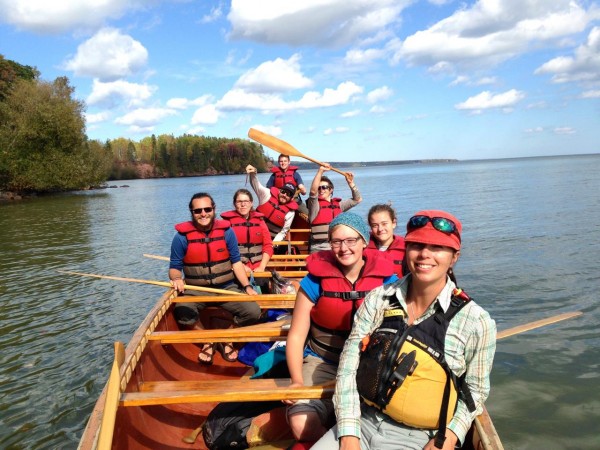
Professor Elizabeth Andre, Dash, and fellow “Fall Block” OED students paddling on Lake Superior in the 36′ Montreal canoe
Back in Ashland, WI, OED students also participate in a series of similarly intensive “block” courses during the fall semester of their junior year at Northland, which Dashiell has recently completed.
“Everyday is something new; we do a variety of things—we cover teaching skills, go to conferences, learn how to identify trees, how to build a debris shelter, or start a fire with a bow drill,” says Potter. Commonly referred to as “Fall Block”, the four-course professional development program combines land travel, water travel, woodland and craft skills (or primitive living skills) and aims to develop students as effective educators.
Another unique aspect to Northland’s OED program is its flexibility, as students are able to select one of three different emphases: Wilderness Leadership, Therapeutic and Universal Design, and Natural History. This way, students are able to focus on cultivating detailed skills useful for specific types of professions they’re interested in pursuing. Nonetheless, Northland’s core values and philosophies are reflected in all three areas of study.
“Our program has a strong foundation in social justice, equity, and inclusion of all people. We also have a foundation in environmental stewardship and sensitivity,” says Northland professor Elizabeth Andre. Through its close analysis of current challenges, practical experience and skill development, as well as future potential for the profession, Northland’s OED curriculum is geared toward promoting a critical awareness amongst their students.
“We believe that outdoor education is a tool for creating the world in which we want to live—through connecting people to the outdoors we help them discover the importance of community both ecological and social,” Andre says. Such philosophies are not only important to the success of their students, but they are also very similar to those at the heart of Prescott’s OED program.
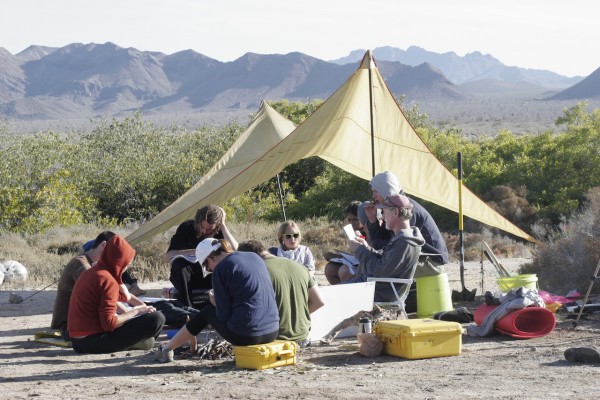
One of Prescott’s Outdoor Classrooms
“Our core values are connecting people with nature and each other in meaningful ways,” says professor Lovejoy. “We value the ability of adventure education to foster self-examination and illuminate issues of fairness and equality.” As these principles are embedded in Prescott’s curriculum, many graduates have reflected favorably upon the attributes gained here. “They have highlighted a passion for working with groups toward a common goal, as well as good communication skills and collaborative abilities,” he says.
As a soon to be graduate, Dashiell Potter is incredibly grateful to have had the opportunity to learn from both professor Andre and professor Lovejoy through his EcoLeague exchange program.
“After I graduate I’d like to work in wilderness therapy or with at-risk youth programs,” he says. “I want to take those people out into the wilderness who don’t have the opportunity to go.” Other professions Northland and Prescott graduates pursue include wilderness guides, outdoor skills instructor, outdoor business owners, program administrators, and environmental educators.
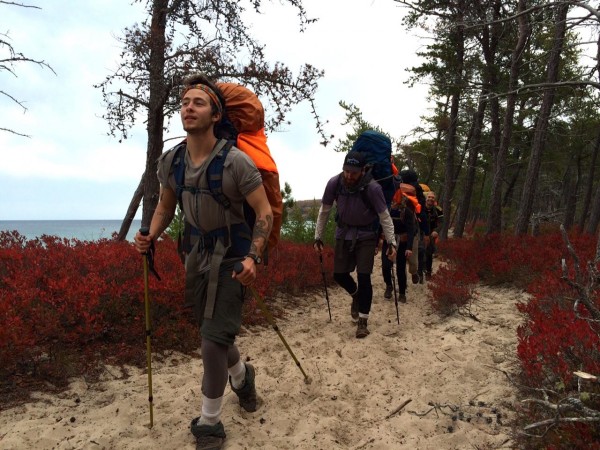
Northland’s Professional Development semester, Dash and other OED students backpacked for six days along the North Country Trail
Regardless of the profession, OED promotes important social and ecological awareness as well as personal growth through intimate connections with the natural world. These EcoLeague schools provide students with extraordinary resources, faculty support, and a riveting landscapes for developing the skills they’ll need to navigate the both outdoor and professional world. “The two areas are pretty incomparable, I have felt wonder paddling the waters of both the North and South. Learning from different professors, experiencing different teaching styles and seeing how they approach adventure education was great to experience,” says Dash.
“Farm Nimbly”: Food Sustainability at EcoLeague Schools APU and GMC
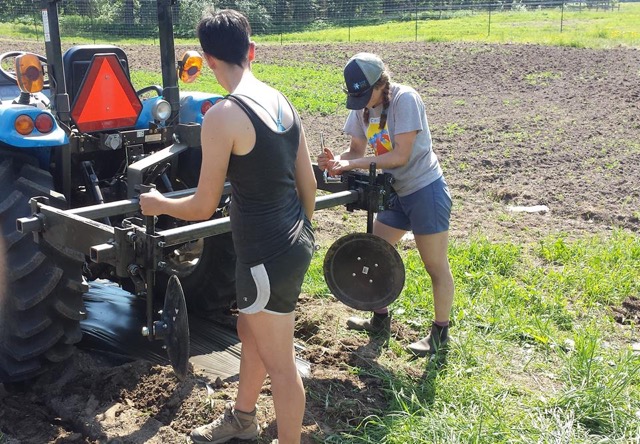
by Jasmyn DiMeglio, EcoLeague Writing Intern
“Growing food in the subarctic is not for the faint of heart,” says Megan Talley, manager of Spring Creek Farm in Palmer, Alaska. With cold, blustery winds and short growing seasons, sustaining a sturdy local food system in this region can be quite challenging.
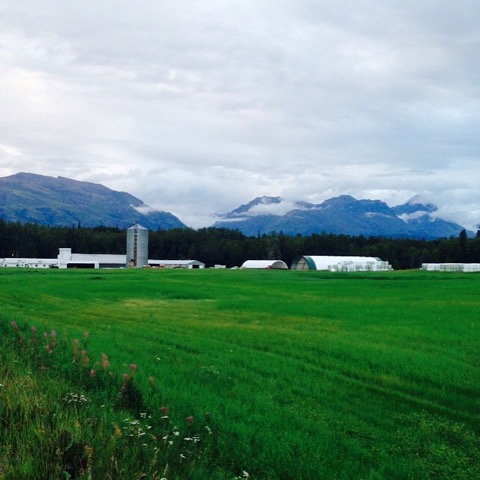
Spring Creek Farm in Palmer, Alaska
However, despite climatic obstacles, Alaska Pacific University’s Spring Creek Farm takes a progressive approach to providing surrounding communities with access to healthy, fresh, and locally grown food. A key part of this approach includes preparing the next generation of food justice activists with important skills and critical lenses to examine both economy and environment while farming in a rapidly changing world.
Meanwhile roughly 4,500 miles away, Cerridwen Farm integrates hands-on learning opportunities with Green Mountain College’s liberal arts education in Poultney, Vermont. Both projects of EcoLeague schools, Spring Creek and Cerridwen Farms are two comprehensive programs that offer ample opportunity for student action, community collaboration, and education in sustainable agriculture. Although located on opposite ends of the continent, the two farms share similar values and philosophies which include environmentally thoughtful growing methods, community building, and a focus on food justice.
As the two farms are located in extremely different bioregions, one might assume that their growing processes would differ as well. However, both GMC and APU’s programs face similar challenges of erratic climate conditions during their growing seasons.
“This part of the Earth is at the forefront of climate change. Unpredictable weather patterns, destructive climate events and soil erosion compound the threat to a secure local food system,” says Talley. Farmers in the Alaskan region also struggle with cold soil temperatures, plant “bolting” from the long hours of daylight, and very dry springs. Such conditions make it crucial that new growers are provided with the tools they need to “farm nimbly” and resist crop loss, which is something Spring Creek Farm strives toward year-round. Though these threats can be discouraging for any farmer, APU’s project and crops continue to thrive and Talley remains optimistic. “The low soil temperatures translate to the sweetest carrots anywhere,” she says.
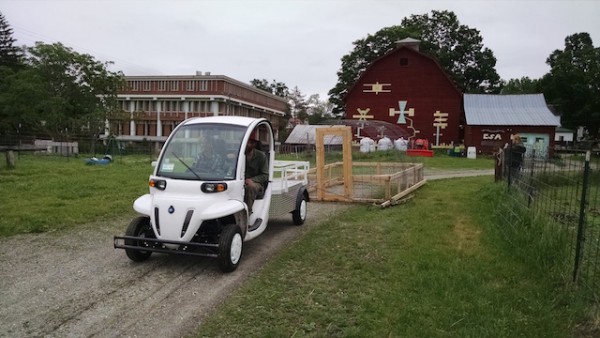
Day at Cerridwen Farm, GMC
“Farming nimbly” is a phrase that Vermont farmers can also appreciate as they grapple with complications of their own, some similar, some unique to their bioregion.
“In the last two years we have worked through a devastating hail storm, incredibly high winds, a record early freeze, and record low winter temperatures,” says Bay Hammond, the farm manager at Green Mountain College’s Cerridwen Farm. Due to these unpredictable weather patterns, GMC growers have become more dependent on their three-season houses. In addition to the outdoor Hillside Garden, the farm also has two High Tunnels and a hoop house for growing heirloom tomatoes, cucumbers, ginger, eggplants, and peppers year round. Though maintaining crops in erratic conditions can be difficult, Hammond believes each hardship becomes an opportunity for learning. These opportunities are always utilized by students involved at the farm. “The students are bright, entrepreneurial, and hard workers. They are dedicated to the farm and always step up to meet the challenges,” Hammond states.
GMC’s Farm and Food Program offers multiple avenues for student involvement at Cerridwen Farm. Some of these options include 1-3 credit skill intensive courses, work-study employment, or joining Farm Crew.
As Eleanor Tison, director of the Food Systems Program explains, “Farm Crew is an all-volunteer student organization overseen by the farm manager. Students in Farm Crew meet weekly, receive weekly email updates, and participate in running the farm.” This organization is a great way for students to apply the skills they learn in the classroom, as it offers many possibilities for engagement. Members of Farm Crew sign up for animal and vegetable chore slots, help with decision making, and become involved with special events, such as the GMC farmers’ market or the October Welsh Harvest Festival, which is an annual event open to the larger community of Poultney.
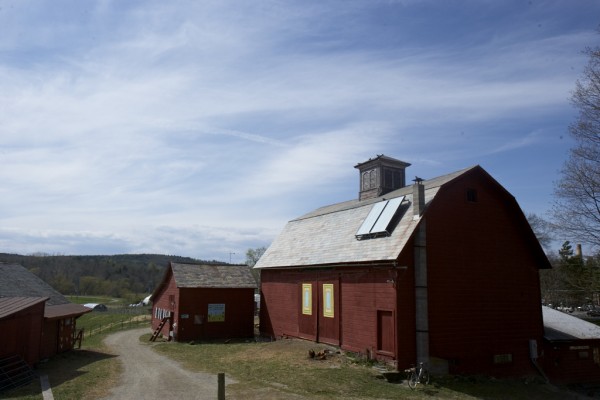
Cerridwen Barn at GMC
Special events are not the only opportunities for community engagement; Cerridwen Farm is always open and accessible to all interested visitors. “As our farm is adjacent to residential neighborhoods in the town of Poultney, we have daily visitors who visit the chickens, pigs, cattle, goats, sheep, and ducks on our farm,” says Tison. GMC also operates a self-serve “farm store” which is open 24/7 for customers looking to purchase eggs, seasonal produce, and frozen meat products.
These EcoLeague Farms are major resources for community collaboration and creative thinking in both Poultney and in Anchorage, AL.
“Community building is the basis for cultivating the Alaskan food movement. We strive to be a hub for sharing meals and ideas which will usher in a more robust and resilient local food system,” says Talley. APU’s program regularly hosts community volunteer opportunities and workshops, which are open to all, students and non-students alike. These workshops encompass many exciting topics such as native plants and permaculture design. Like the Cerridwen Farm, Spring Creek also operates a small-scale Community Supported Agriculture Share (CSA) and has a booth at the community farmers market in Anchorage. Talley describes the downtown market as a “vibrant community staple and social event” that brings folks together on a weekly basis.
The CSA program and farmers market are only two of four destinations for the produce grown through the program. Another place where Spring Creek Farm’s vegetables are used is on campus in the cafeteria. As much food as possible is distributed to dining services, but the farm also donates a portion of their bounty to low income-families through their “Alaska Tilth” program. In a fight to end hunger, Alaska Tilth was founded in collaboration with the University of Alaska’s Experiment Farm and the cooperative extension of the Supplemental Nutritional Assistance Program (SNAP).
“The fresh food our farm donates is brought to food pantries each week by a SNAP educator who demonstrates seasonal cooking with fresh ingredients, sharing a meal with those in need,” says Talley. Only within its first year of operation, Alaska Tilth has been a huge success and has plans for expansion in 2017.
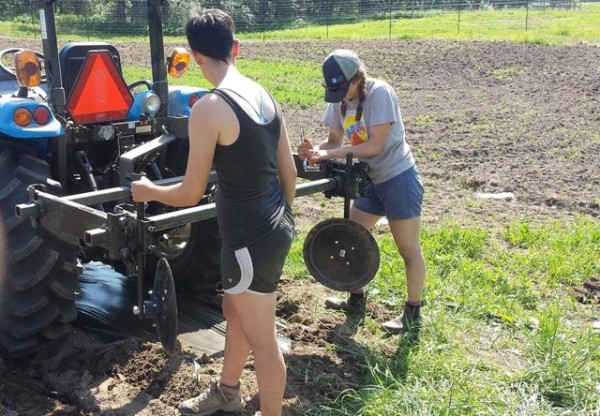
Fixing the Tractor, Spring Creek Farm
Both Spring Creek and Cerridwen Farms work as springboards for larger visions of the future. Exemplifying strong commitment to their communities, to the futures of their students, as well as to the land, these EcoLeague programs are able to thrive year round, despite climatic hardships. Offering multiple opportunities for involvement, an abundance of locally grown food, and important skills for future generations, the programs set great examples for farmers nationwide.
EcoLeague Stories: Green Mountain College

“Any experience where you are immersed in a different culture is worthwhile. Experiencing a different way of life will make you more critical and appreciative of your own beliefs and values.”
Sophie Holtz, a junior at Northland College, in an interview about her EcoLeague exchange to Green Mountain College. Read more about Sophie’s story, and how EcoLeague exchanges expand a student’s academic career and worldview at Northland’s Meet Our Students page.
Fall 2015: EcoLeague Exchange Students On The Move!
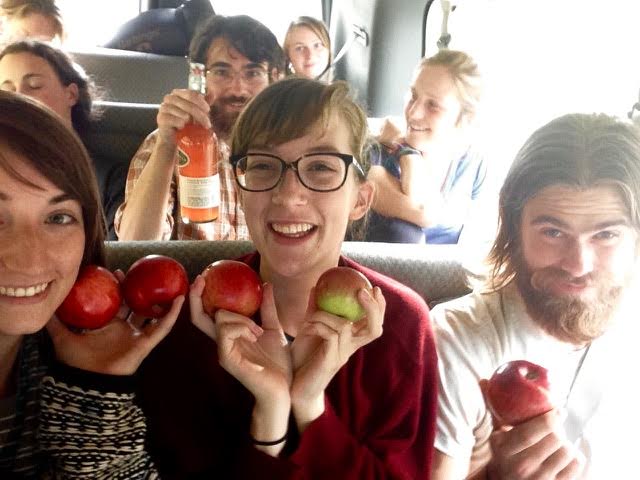
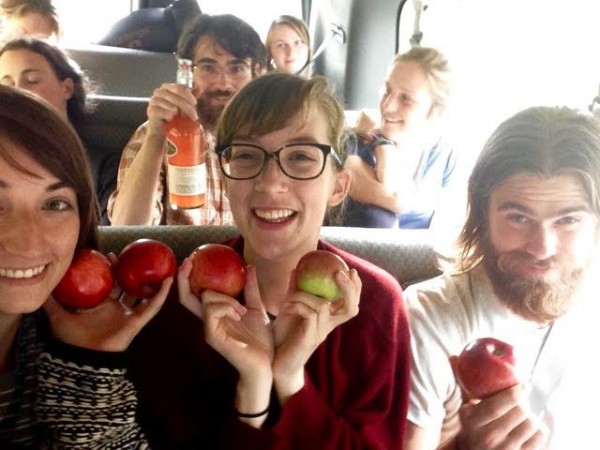
Claire Jordy (center) returning from a 2-day field trip to Vermont to study apples as part of the course “The History of Apples”. Claire is currently on exchange to COA from Dickinson.
by Jazzy DiMeglio, EcoLeague Writing Intern
What moves us, physically and figuratively? For one student, it might be an interest in apples that sparks an entire track of education. For another, a passion for soil and social justice that inspires plans for urban farming. Or perhaps it is simply a change of place that refreshes our perspective.
Claire, Emmanuel, and Elena are three of fifteen students participating in the EcoLeague exchange program this fall. A consortium of six different liberal arts colleges across the country, the EcoLeague allows students to shift their studies to another school for a semester or two during their undergraduate career. Located in different bioregions and with unique campus cultures, each EcoLeague college remains connected to the others by core values of environmental awareness, social change, and sustainability. While exploring new ecosystems, new communities, and new academic courses, the EcoLeague student is challenged to develop skills and perspectives that will not only enrich their education but also prepare them for life after college.
“I feel like I’m making a tool box,” says Claire Jordy, a junior, majoring in Environmental Studies. Currently, Claire is studying on the brisk shores of Bar Harbor, Maine, at College of the Atlantic. Although less than half the size of Dickinson College, her “home” school, COA still offers unique courses that she wouldn’t be able to take at home. Learning new skills she will be able to apply to her senior project is a major benefit of participating in an EcoLeague exchange.
“COA offers more ‘site specific’ courses,” she says. One class that drew Claire to the college is “The History of Apples.” In this course she and her classmates learn how to identify apples of the region and study the importance of preserving seedling variety. Claire dreams of one day owning her own orchard, so “The History of Apples” is especially relevant to her future aspirations. Additionally, at COA, Claire is able to work on anthropologic research methods, which she plans to use for a capstone project at Dickinson. Aside from the academics, another highlight of the EcoLeague experience for Claire has been living in a new setting. Though a bit chilly, she likes swimming in the Atlantic Ocean and hiking in the mountains of Arcadia National Park.
While Claire enjoys unique courses and exploring new landscapes in Maine, Emmanuel Greeno is developing a deeper appreciation for his home of COA while studying in Arizona this semester.
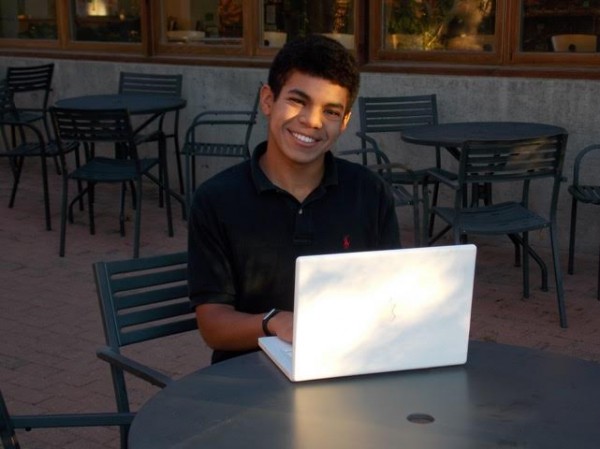
Emmanuel Greeno enjoys working outside in the surprisingly mild temperatures of Prescott, Arizona. Greeno is currently on exchange to Prescott from COA.
“I like the academics and the people here, but I really love my ‘home’ school even more now,” says Greeno of his experience at Prescott College. Also a junior, Emmanuel is on track to graduate with a Bachelor of Arts in Human Ecology, the self-directed, interdisciplinary degree that is COA’s trademark. Although immersing himself in a new community has been a high point for Emmanuel, it has also been a challenge. Prescott conducts most of its classes in the field and the majority of its students live off-campus, a sharp contrast to COA’s island location where most undergraduates are in close proximity to one another. At his home school of roughly 350 students, the community is very tight-knit, something he misses at Prescott. One place he notices this difference is in Prescott’s dining cafés, which are set-up restaurant style. Emmanuel describes eating as a “human ritual” and misses the cafeteria at COA, which is not only a place to eat, but also a place to “take a break” and connect with others.
Despite these differences, Emmanuel is enjoying his time in Arizona. A major plus for him is the academic structure available at Prescott. This semester he is taking all psychology courses. He likes that at Prescott, the psychology classes are already “established” and he can simply enroll in them, rather than having to construct a course on his own through independent study.
Going home with a fresh perspective is something else Emmanuel looks forward to adding to his education, much like Elena Santos, who has traveled from Green Mountain College in Poultney, VT to Dickinson College in Carlisle, PA for the semester. With hopes of one day starting an urban farm, Elena chose to go on an EcoLeague exchange to help her accomplish this goal. By pairing her studies in Sustainable Agriculture and Food Systems at GMC with sociology-based courses at Dickinson, she feels more prepared to farm in cities with diverse populations.
“There are a lot of perspectives at Dickinson that aren’t available at Green Mountain,” she says. Although sustainability and small class sizes are shared values at both GMC and Dickinson, Elena has noticed more differences than similarities between the two institutions. With over 2,000 students, Dickinson has a wide array of clubs and organizations to get involved with, such as dancing or language clubs. While GMC specializes in courses taught through an environmental lens, Dickinson’s curricula emphasizes multi-cultural studies, a combination Elena appreciates being able to build into her academic career.
“There are more professors of color here! That really excites me,” she says. Additionally, Dickinson hosts many international students, which creates a diverse social climate on campus. Right now, Elena is taking two courses in Gender Studies as well as the course “African American Food Ways”. Incorporating more world-views into her studies has been the best part of her EcoLeague exchange.
An EcoLeague exchange provides students with the opportunity to follow their passions. According to Claire, Emmanuel, and Elena, following passion pays off. Whether it be useful skills for a future career, a new-found appreciation for home, or increased cultural awareness, these students will return to their colleges enriched by their exchange. Movement, both physical and figurative, is possible through EcoLeague.
2016 EcoLeague Retreat Dates and Location Announced
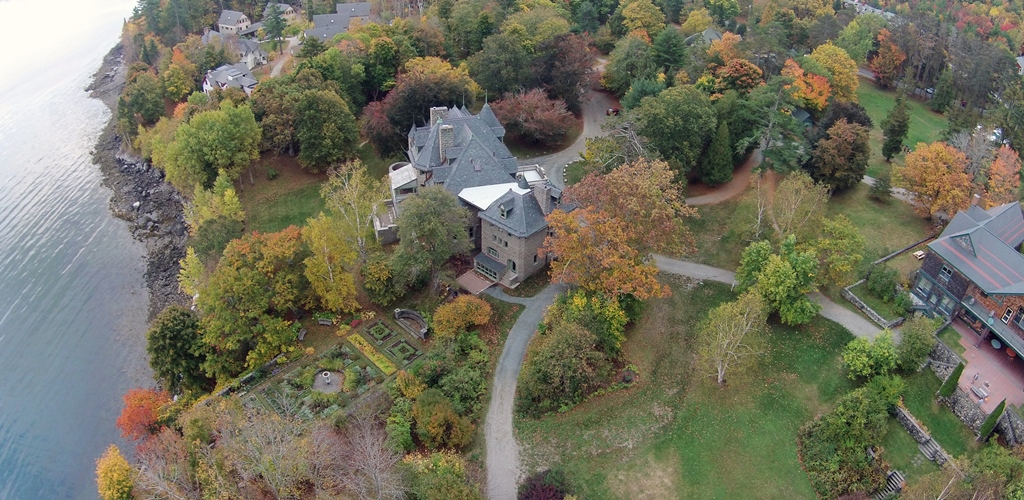
The EcoLeague‘s annual retreat, which brings together representatives from all six consortium schools, will be held from June 16 – 18, 2016 at the College of the Atlantic in Bar Harbor, Maine. This annual retreat creates space for crafting new initiatives and fosters collaboration across campuses. The 2016 theme for the retreat will be announced in the fall; please check back for details.
EcoLeague Schools Recommended as Great for Nature Lovers
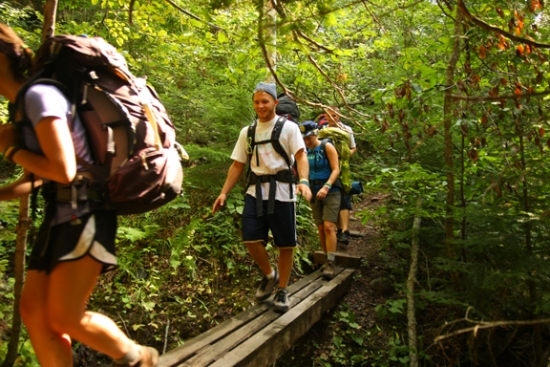
Five EcoLeague colleges made the list of recommended schools for students looking for “the perfect balance between academics and outdoor activities you can enjoy” according to the article 30 Great Small Colleges for Nature Lovers, featured on Great Value Colleges. Universities and colleges were ranked via a points system that takes into account the number of nature-focused courses/degree programs, proximity to outdoor opportunities, a university’s green status, the campus and surrounding area, and the number of outdoor-oriented sports, clubs and teams.
Here’s what the article has to say about each EcoLeague School:
#15: Within the 155 acres of Green Mountain College’s campus, students will find an organic farm, a ropes course and many hiking and biking trails. This college’s curriculum centers around nature with undergraduate majors like adventure education, animal conservation & care, environmental studies, natural resources management, renewable energy & ecological design, sustainable agriculture & food production and wilderness & outdoor therapy.
If choosing one of those majors is not enough to satisfy your love for nature, you can join any of the many outdoor trips and clubs, such as the outdoor recreation alliance, skate club, Farm Crew, equestrian, the ski shop and more.
Green Mountain became the second college in the nation to become carbon neutral in 2011 after installing a biomass plant, a wind turbine and solar panels.
#21: While Anchorage offers students a vast base of exploration in the wilderness of Alaska, Alaska Pacific University promotes responsible stewardship of the environment through its “Active Learning” program. Students can study the terrain and wildlife of the state through this program with hands-on interactions with their natural surroundings. And Alaska Pacific offers a variety of nature-related majors and minors, like marine biology, outdoor studies, sustainability studies, Earth sciences and environmental science. In fact, five out of the seven undergraduate degree programs deal with nature.
On the school’s 175-acre campus, students can connect to the Anchorage Trail System, which provides 5 km of continuous trails and includes Hillside/Service, Bicentennial Park, Chester Creek Greenbelt, the Coastal Trail and Kincaid Park.
#22: Northland College has a distinctive environmental liberal arts curriculum with a beautiful natural location for nature-loving students to achieve their goals. According to Her Campus, a typical student at this school is described as a “friendly ‘environmentalist tree-hugger’” with a penchant for activism and outdoor activities. A student’s experience at Northland actually begins with a required Outdoor Orientation trip, which consists of five- to 12-day adventures with kayaking, sailing, camping, astronomy-themed backpacking and more.
Northland works with the Sigurd Olson Environmental Institute to promote stewardship, identify opportunities, deliver educational programs and facilitate solutions that address environmental issues. The sustainability advances of this school are beyond most on this list.
#23: The College of the Atlantic is said to live and breathe sustainability. The few hundred students at this school are all enrolled in human ecology, which is the study of our species’ relationship to the planet. It was the first school to go completely carbon-neutral in 2007. The school’s teaching methods largely consist of field-based learning and community involvement, making it impossible to stay indoors. The campus surrounds two organic farms and two off-shore island research stations. The campus is situated in the Mt. Desert Island, which is covered by the Acadia National Park.
Incoming students have the opportunity to go on the school’s many outdoor orientation programs, which explore Maine’s wilderness with rock climbing, sailing, kayaking, diving and more. Although the school only offers the one major in human ecology, students have the ability to design that major by choosing different classes in subjects like animal behavior or jazz, rock and blues.
#25: Prescott College is based in a mountain town where rock climbers flock for trad and sport climbing on Granite Mountain; the town of Prescott has an elevation of 5,347 feet. According to Outside Magazine, 60 percent of Prescott students—who self-design their curriculum—choose environmental studies or adventure education. The school also operates a marine research station in Bahia Kino, Mexico.
For those of you nature lovers who like the sound of majoring in adventure education, Prescott’s website explains, “An Adventure Education graduate may be found guiding clients safely up a vertical rock face, forecasting avalanche dangers at a Forest Service avalanche center, piloting a raft on a whitewater river to monitor ecosystem health, or managing logistics and field risks while scientists work on a remote ice cap.”
Students who attend an EcoLeague member college have the opportunity to attend up to two other schools in the consortium for the same tuition as their home school; their financial aid package and other scholarships also apply toward their semester away from home. This means a nature-loving student from Prescott College can round out their degree with a semester spent studying sustainability at Northland College, whale watching during biology class at Alaska Pacific University, or any other number of unique experiences offered by the EcoLeague Consortium.
EcoLeague Schools Gain Praise for Green, Environmental Programs
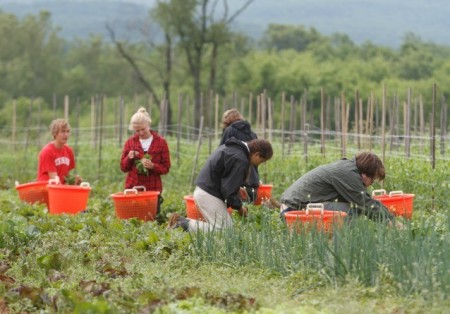
Four EcoLeague Colleges made media lists as green colleges with strong environmental programs recently. Northland College was listed as number one in Mother Nature Network‘s special feature “10 of the Best College Environmental Programs in the U.S”. Green Mountain College and College of the Atlantic were also highlighted; EcoLeague Consortium Schools comprised over a third of the colleges represented in the article. In MNN’s “17 Amazing Green College Campuses” both Dickinson and Green Mountain College were praised for their farm-to-cafeteria programs.
Some highlights from the features:
Northland College: “At Northland College, environmental studies isn’t just a major — it’s a part of the school’s education requirements across all curricula. The Environmental Sciences Department offers majors in environmental chemistry and environmental geosciences; the Natural Resources department includes emphases on ecological restoration, fisheries ecology, and wildlife ecology; and the Nature and Culture Department allows majors in outdoor education, humanity and nature studies. The Sigurd Olson Environmental Institute brings environmental responsibility to the surrounding community, and since 1971 the school has stressed sustainability across the board: Classes like sustainable business, sustainable agriculture, and renewable energy prepare students for a green future, while an off-grid building insulated with straw bales and an eco-friendly residence hall that was a prototype for the LEED rating system help them understand sustainability now.”
College of the Atlantic: “While the other colleges on this list offer a wide variety of environmentally-related degrees, College of the Atlantic takes the opposite approach: Students share one major — human ecology — and then tailor the course load to his or her own specific interests. Social and environmental issues take center stage though, as all the students are expected to address them through their self-designed curriculum and senior project; examples of past projects include a photographic exhibit based on the birds of Hawaii; one student’s wilderness immersion trip along a Virginia creek; and a multimedia fundraiser for a Zimbabwean nonprofit.”
Green Mountain College: “This Vermont school is the first U.S. college to achieve climate neutrality through campus-wide efficiency, adoption of clean energy, and purchase of local carbon offsets. Every course of study has environmental, social and economic sustainability as an overall theme and nearly half of all graduates end up with green careers. The campus generates 80 percent of its heat from a $5.8 million biomass plant that burns locally harvested wood chips, and the school plans to meet all of its energy needs with 100 percent renewable energy by 2020. Green Mountain is also a leader in sustainable farming education. The campus 21-acre Cerridwen Farm supplies produce for the dining hall where food scraps are later collected and used as compost for the farm.”
Dickinson College: “Student farmers grow organic vegetables and raise free-range livestock on this Carlisle, Pennsylvania, school’s 50-acre USDA certified-organic college farm. Food from the farm is served in the dining hall, sold at a local farmers market, and donated to a community food bank. Each day 800 pounds of food waste is sent back to the farm to be converted into compost, cutting in half the volume of waste sent from the dining hall to landfills. The college offers more than 100 sustainability courses, integrated throughout the curriculum and across many majors. In 2013-14, nearly 60 percent of students took at least one sustainability-related course. The school has created a Climate Action Plan to achieve climate neutrality by 2020.”